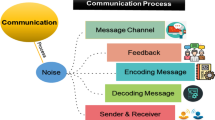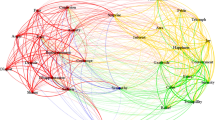Abstract
Excuse-making is defined, and the issues of deception and verbal/nonverbal presentations are discussed in regard to the excuse process. Subsequently, the deception and verbal/nonverbal issues are described in greater detail in the context of whether the excuse occurs temporally after a negative outcome (retrospective), before a negative outcome (anticipatory), or as part of the characterological makeup of the person (incorporated). Going from retrospective to anticipatory to incorporated excuses, it is concluded that the role of nonverbal factors increases. Likewise, in the progression from making to “being” the excuse, it is argued that self- and other-deception also become more pervasive.
Similar content being viewed by others
References
Adler, A. (1927).The practice and theory of individual psychology. New York: Harcourt.
Allport, G.W. (1937).Personality: A psychological interpretation. New York: Holt.
Arkin, R. M., & Baumgardner, A. H. (1985a). Self-handicapping. In J. H. Harvey & G. Weary (Eds.),Attribution: Basic issues and applications (pp. 169–202). New York. Academic Press.
Arkin, R. M., & Baumgardner, A. H. (1985b).The facilitative effects of providing a self-handicap. Unpublished manuscript, University of Missouri-Columbia. Reported in Baumgardner, A.H., & Arkin, R. M. (1987). Coping with the prospect of social disapproval: Strategies and sequelae. In C. R. Snyder & C. E. Ford (Eds.),Coping with negative life events: Clinical and social psychological perspectives (pp. 323–346). New York: Plenum.
Arkin, R. M., & Baumgardner, A. H. (1986). Self-presentations and self-evaluation: Processes of self-control and social control. In R. F. Baumeister (Ed.),Public self and private self (pp. 75–97). New York: Springer-Verlag.
Bandura, A. (1986).Social foundations of thought and action: A social cognitive theory. Englewood Cliffs, N.J.: Prentice-Hall.
Berglas, S. (1985). Self-handicapping and self-handicappers: A cognitive/attributional model of interpersonal self-protective behavior. In R. Hogan (Ed.),Perspectives in personality (Vol. 1, pp. 235–270). Greenwich, CT.: JAI.
Berglas, S., & Jones, E. E. (1978). Drug choice as a self-handicapping strategy in response to noncontingent success.Journal of Personality and Social Psychology, 36 405–417.
Bowerman, W. R. (1978). Subjective competence: The structure, process, and function of self-referent causal attributions.Journal for the Theory of Social Behavior, 8 45–75.
Bradley, G. W. (1978). Self-serving biases in the attribution process: A reexamination of the fact or fiction question.Journal of Personality and Social Psychology, 36 56–71.
Burger, J. M. (1981). Motivational biases in the attribution of responsibility for an accident: A meta-analysis of the defensive attribution hypothesis.Psychological Bulletin, 90 496–512.
Critchlow, B. (1985). The blame in the bottle: Attributions about drunken behavior.Personality and Social Psychology Bulletin, 11 258–274.
Darley, J. M., & Fazio, R. H. (1980). Expectancy confirmation processes arising in the social interaction sequence.American Psychologist, 35 867–881.
DeGree, C. E., & Snyder, C. R. (1985). Adler's psychology (of use) today: Personal history of traumatic life events as a self-handicapping strategy.Journal of Personality and Social Psychology, 48 1512–1519.
DepUalo, B. M., Stone, J. I., & Lassiter, G. D. (1985). Deceiving and detecting deceit. In B. R. Schlenker (Ed.),The self and social life (pp. 323–370). New York: McGraw-Hill.
Felson, R. B. (1980). Communication barriers and the reflected appraisal process.Social Psychology Quarterly, 43 223–233.
Fenichel, O. (1945).The psychoanalytic theory of neurosis. New York: W. W. Norton.
Folkes, V. S. (1982). Communicating the causes of social rejection.Journal of Experimental Social Psychology, 18 235–252.
Goffman, E. (1955). On face-work: An analysis of the ritual elements in social interaction.Psychiatry: Journal for the Study of Interpersonal Processes, 18 213–231.
Greenberg, J., Pyszczynski, T., & Paisley, C. (1985). Effects of extrinsic incentives on use of test anxiety as an anticipatory attributional defense: Playing it cool when the stakes are high.Journal of Personality and Social Psychology, 47 1136–1145.
Greenwald, A. G. (1980). The totalitarian ego: Fabrication and revision of personal history.American Psychologist, 35 603–618.
Handelsman, M. M., Kraiger, K., & King. C. S. (1985).Self-handicapping by task choice: An attribute ambiguity analysis. Paper presented at the Rocky Mountain Psychological Association, Tucson, AZ.
Harris, R. N., & Snyder, C. R. (1986). The role of uncertain self-esteem in self-handicapping.Journal of Personality and Social Psychology, 51 451–458.
Heider, F. (1958).The psychology of interpersonal relations. New York: John Wiley & Sons.
Higgins, R. L., & Harris, R. N. (in press). Strategic alcohol use: Drinking to self-handicap.Journal of Social and Clinical Psychology.
Higgins, R. L., & Snyder, C. R. (in press a). The business of excuses. In R. A. Giacalone & P. Rosenfeld (Eds.),Impression management in the organization. Hillsdale, N.J.: Erlbaum.
Higgins, R. L., & Snyder, C. R. (in press b). Excuses gone awry: An analysis of self-defeating excuses. In R. L. Curtis (Ed.)Self-defeating behaviors: Experimental research and practical implications. New York: Plenum.
Higgins, R. L., & Snyder, C. R. (in press c).Self-handicapping: The paradox that isn't. New York: Plenum.
Hill, M. G., Weary, G., & Williams, J. (1986). Depression: A self-presentation formulation. In R. F. Baumeister (Ed.),Public self and private self (pp. 213–239). New York: Springer-Verlag.
Jacobs, L., Berscheid, E., & Walster, E. (1971). Self-esteem and attraction.Journal of Personality and Social Psychology, 17 84–91.
James, W. (1890).The principles of psychology (Vols. 1 & 2). New York: Holt.
Jones, E. E., & Berglas, S. (1978). Control of attributions about the self through self-handicapping strategies: The appeal of alcohol and the role of underachievement.Personality and Social Psychology Bulletin, 4 200–206.
Jones, E. E., Stires, L. K., Shaver, K. G., & Harris, V. A. (1968). Evaluation of an ingratiator by target persons and bystanders.Journal of Personality, 36 349–385.
Kolditz, T. A., & Arkin, R. M. (1982). An impression management interpretation of the self-handicapping strategy.Journal of Personality and Social Psychology, 43 492–502.
Langer, E. J. (1983).The psychology of control. Beverly Hills, CA.: Sage.
Leary, M. R., & Shepperd, J. A. (1986). Behavioral self-handicaps versus self-reported handicaps: A conceptual note.Journal of Personality and Social Psychology, 51 1265–1268.
Martin, M. W. (Ed.) (1985).Self-deception and self-understanding. Lawrence, KS.: University Press of Kansas.
Maslow, A. H. (1968).Toward a psychology of being (2nd. ed). New York: Van Nostrand.
Mayerson, N. H., & Rhodewalt, F. (in press). The role of self-protective attributions in the experience of pain.Journal of Social and Clinical Psychology.
Miller, D. T. (1976). Ego involvement and attribution for success and failure.Journal of Personality and Social Psychology, 34 901–906.
Miller, D. T., & Norman, S. A. (1975). Actor-observer differences in perception as a consequence of the need for effective control.Journal of Personality and Social Psychology, 31 503–515.
Reagan, R. (1987). Text of speech.New York Times March 5, 1987, p. 12.
Rogers, C. R. (1951).Client-centered therapy: Its current practice, implications, and theory. Boston: Houghton-Mifflin.
Schlenker, B. R. (1980)Impression management: The self-concept, social identity, and interpersonal relations. Monterey, CA.: Brooks/Cole.
Schlenker, B. R., & Miller, R. S. (1977). Egocentrism in groups: Self-serving biases or logical information processing?Journal of Personality and Social Psychology, 35 755–764.
Schneider, D. J., Hastorf, A. H., & Ellsworth, P.C. (1979).Person perception, Reading, MA.: Addison-Wesley.
Schönbach, P. (1985).A taxonomy for account phases: Revised, explained, and applied. Unpublished manuscript, Fakultat für Psychologie, Ruhr Universitat, Bochum, West Germany.
Schouten, D. G., & Handelsman, M. M. (in press). Social basis of self-handicapping: The case for depression.Personality and Social Psychology Bulletin.
Sears, D. O. (1983). The person-positivity bias.Journal of Personality and Social Psychology, 44 233–250.
Smith, T. W., Snyder, C. R., & Handelsman, M. M. (1982). On the self-serving function of an academic wooden leg: Test anxiety as a self-handicapping strategy.Journal of Personality and Social Psychology, 42 314–321.
Smith, T. W., Snyder, C. R., & Perkins, S. C. (1983). The self-serving function of hypochondriacal complaints: Physical symptoms as self-handicapping strategies.Journal of Personality and Social Psychology, 44 787–797.
Snyder, C. R. (1985). Collaborative companions: The relationship of self-deception and excuse-making. In M. W. Martin (Ed.),Self-deception and self-understanding (pp. 35–51), Lawrence, KS.: University Press of Kansas.
Snyder, C. R., & Higgins, R.L. (in press a). Reality negotiation and excuse-making: Iran arms scandal speech and other literature. In M. J. Cody & M. L. McLaughlin (Eds.),Psychology of tactical communication. Clevedon, England: Multilingual Matters.
Snyder, C. R., & Higgins, R. L. (in press b). Excuses: Their effective role in the negotiation of reality.Psychological Bulletin.
Snyder, C. R., Higgins, R. L., & Stucky, R. J. (1983).Excuses: Masquerades in search of grace. New York: Wiley-Interscience.
Snyder, C. R., & Smith, T. W. (1982). Symptoms as self-handicapping strategies: The virtues of old wine in a new bottle. In G. Weary & H. L. Mirels (Eds.),Integrations of clinical and social psychology (pp. 104–127). New York: Oxford University Press.
Snyder, C. R., Smith, T. W., Augelli, R. W., & Ingram, R. E. (1985). On the self-serving function of social anxiety: Shyness as a self-handicapping strategy.Journal of Personality and Social Psychology, 48 970–980.
Taylor, S. E., & Brown, J. D. (1988). Illusion and well-being: A social psychological perspective on mental health.Psychological Bulletin, 103 193–210.
Tesser, A., & Rosen, S. (1975). The reluctance to transmit bad news. In L. Berkowitz (Ed.),Advances in experimental social psychology (Vol. 8, pp. 193–232). New York: Academic Press.
Tetlock, P. E. (1981). The influence of self-presentation goals in attributional reports.Social Psychology Quarterly, 44 300–311.
Tucker, J. A., Vuchinich, R. E., & Sobell, M. (1981). Alcohol consumption as a self-handicapping strategy.Journal of Abnormal Psychology, 90 220–230.
Weiner, B., Amirkhan, J., Folkes, V. S., & Verette, J. A. (1987). An attributional analysis of excuse giving: Studies of a naive theory of emotion.Journal of Personality and Social Psychology, 52 316–324.
Wells, L. E., & Marwell, G. (1976).Self-esteem: Its conceptualization and measurement. Beverly Hills, CA.: Sage.
White, R. W. (1959). Motivation reconsidered: The concept of competence.Psychological Review, 66 297–333.
Wylie, R. C. (1974).The self-concept: A review of methodological and measuring instruments (Vol. 1, rev. edition). Lincoln: University of Nebraska Press.
Wylie, R. C. (1979).The self-concept: Theory and research on selected topics (Vol. 2, revised edition). Lincoln: University of Nebraska Press.
Zuckerman, M. (1979). Attribution of success and failure revisited, or: The motivational bias is alive and well in attribution theory.Journal of Personality, 47 245–287.
Author information
Authors and Affiliations
Rights and permissions
About this article
Cite this article
Snyder, C.R., Higgins, R.L. From making to being the excuse: An analysis of deception and verbal/nonverbal issues. J Nonverbal Behav 12, 237–252 (1988). https://doi.org/10.1007/BF00987594
Issue Date:
DOI: https://doi.org/10.1007/BF00987594




